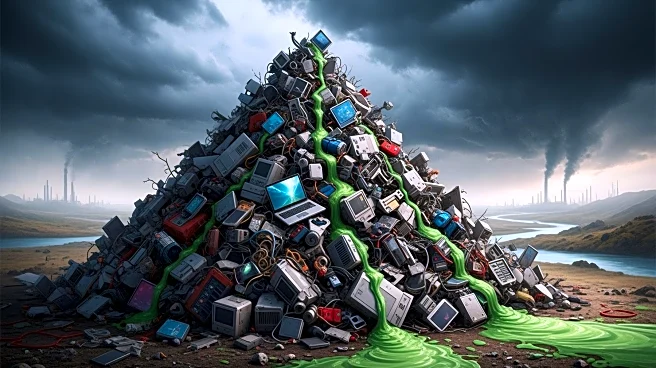What's Happening?
A recent report by the Basel Action Network (BAN) has revealed that millions of tons of electronic waste from the United States are being exported to Southeast Asia, creating a 'hidden tsunami' of hazardous waste. The report identifies at least 10 U.S.
companies involved in exporting used electronics to Asia and the Middle East. These exports include discarded devices such as phones and computers, which contain toxic metals like lead, cadmium, and mercury. The report highlights that approximately 2,000 containers, equating to about 33,000 metric tons of used electronics, leave U.S. ports monthly. This practice is contributing to environmental degradation in countries like Malaysia, Thailand, and Indonesia, where much of the waste is improperly handled, leading to pollution and health risks for local communities.
Why It's Important?
The export of e-waste from the U.S. to developing countries poses significant environmental and health challenges. These nations often lack the infrastructure to safely process such waste, resulting in toxic chemicals leaching into the environment and affecting public health. The practice also raises ethical concerns about 'waste colonialism,' where wealthier nations offload their waste problems onto less developed countries. This situation underscores the need for stricter regulations and enforcement of international treaties like the Basel Convention, which aims to prevent hazardous waste trade to countries that cannot manage it safely. The report also questions the effectiveness of industry certifications meant to ensure responsible recycling, suggesting a need for more robust oversight.
What's Next?
In response to the report, authorities in countries like Thailand and Malaysia have increased efforts to curb illegal e-waste imports. For instance, Thai authorities recently seized 238 tons of U.S. e-waste, while Malaysian authorities confiscated e-waste worth $118 million in nationwide raids. These actions indicate a growing awareness and crackdown on illegal waste imports. Moving forward, there may be increased pressure on the U.S. government and companies to adhere to international waste management standards and reduce the export of hazardous materials. Additionally, there could be calls for more transparency and accountability in the e-waste recycling industry to prevent environmental harm.
Beyond the Headlines
The issue of e-waste exports highlights broader systemic problems in global waste management and environmental justice. It raises questions about the responsibility of developed nations to manage their waste sustainably and the ethical implications of transferring environmental burdens to less developed regions. This situation may prompt discussions on the need for a circular economy approach, where products are designed for longevity and recyclability, reducing the overall generation of waste. Furthermore, it could lead to increased advocacy for international cooperation and stronger enforcement of environmental treaties to protect vulnerable communities from the adverse effects of hazardous waste.















